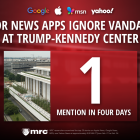Can states put social media platforms on notice for censoring Americans, or are these platforms broadly protected to prohibit or limit content online with impunity? These are some of the questions that the Supreme Court may decide.
Here’s what you need to know about the cases.
Today, the Court heard two separate but related legal cases that dealt with Texas and Florida free speech laws working to punish social media platforms that selectively censor online content. But NetChoice–a company representing Big Tech platforms, including Meta, Amazon, Google, PayPal, Pinterest, Snap, TikTok and X (formerly Twitter) among others–took issue with the laws and filed lawsuits. The cases, dubbed NetChoice v. Paxton and Moody v. NetChoice, are against Ken Paxton and Ashley Moody, the attorneys general of Texas and Florida, respectively.
Attorney and MRC Free Speech America Director Michael Morris scolded Big Tech for its efforts to continue censoring Americans. "The bottom line: Big Tech companies want to have their cake and eat it too,” Morris said. “They've been at this censorship game for a long time, and now that Florida and Texas have stepped in with legislation, the chickens are coming home to roost. Either social media companies are responsible for the content that exists on their platforms (as publishers) or they're entitled to certain, specified liability protections for posts made by third parties on their open platforms via Section 230 of the Communications Decency Act. They can't have it both ways."
First, NetChoice v. Paxton. What’s the Case About?
Texas Governor Greg Abbott (R) signed House Bill 20 in September 2021, broadly protecting Texas residents from censorship on social media platforms. The law classifies social media companies as "common carriers" and prevents Big Tech companies from banning American users based on their political viewpoints. As a common carrier—meaning they provide services to the public and control access to other markets—the social media platforms would be forbidden from discriminating based on viewpoint.
"Social media websites have become our modern-day public square,” Abbott said in a statement the day he signed the law. “They are a place for healthy public debate where information should be able to flow freely — but there is a dangerous movement by social media companies to silence conservative viewpoints and ideas.”
Then, Moody v. NetChoice – Is It Different?
In May 2021, Florida Governor Ron DeSantis (R) signed Senate Bill 7072, a law that sought to fix some of the censorship that plagued the 2020 presidential election: Big Tech’s censorship of the Hunter Biden laptop bombshell and the banning of then-sitting President Donald J. Trump.
Like Texas’s, Florida’s pro-free speech law similarly uses common carriership to block social media companies from censoring news organizations, excluding an enumerated list of reasons, including but not limited: child exploitation and other unlawful activities.
In 2020, Big Tech platforms shielded then-Democratic presidential candidate Joe Biden by blocking the spread of the New York Post’s bombshell reporting on the infamous “Laptop From Hell.” The Post’s reporting, perhaps for the first time, helped to cement years-long allegations that Biden was aware of, and even participated in, the contentious business dealings of his embattled son, Hunter Biden.
Big Tech’s censorship of the Hunter Biden bombshell tilted the 2020 presidential election in favor of Biden, according to an MRC survey conducted by The Polling Company published on Nov. 24, 2020. The poll specifically found that 45 percent (out of 1,750 polled Biden voters) conceded not knowing of Joe Biden’s role in Hunter Biden’s dealings. “According to our poll, full awareness of the Hunter Biden scandal would have led 9.4% of Biden voters to abandon the Democratic candidate, flipping all six of the swing states he won to Trump, giving the President 311 electoral votes,” the MRC wrote at the time.
(Related: EXCLUSIVE: ‘Laptop from Hell’ Reporters Detail How Big Tech Shielded Biden from Scandals)
The Florida law also classifies Big Tech censorship meant to hurt a political candidate as an “in-kind contribution” to that candidate’s political opponent. This classification can be avoided by disclosing each censorship action as an independent expenditure. This particular section of the law indirectly alluded to Big Tech platforms banning Trump’s accounts over the events that occurred at the U.S. Capitol on Jan. 6.
“Many in our state have experienced censorship and other tyrannical behavior firsthand in Cuba and Venezuela,” DeSantis said in a press statement announcing the bill on May 24, 2021. “If Big Tech censors enforce rules inconsistently, to discriminate in favor of the dominant Silicon Valley ideology, they will now be held accountable.”
What is NetChoice’s Argument?
NetChoice, representing Big Tech companies in both cases, effectively seeks to block both laws, arguing that Texas and Florida are infringing on social media companies’ First Amendment rights. In one sense, NetChoice appears to be asking the Court to create a constitutional right to censor. NetChoice insists that the laws compel the social media platforms to speak.
MRC Counsel for Investigations Tim Kilcullen contributed to this report through legal analysis.
Conservatives are under attack. Contact your representatives and demand that Big Tech be held to account to mirror the First Amendment while providing transparency, clarity on hate speech and equal footing for conservatives. If you have been censored, contact us using CensorTrack’s contact form, and help us hold Big Tech accountable.









